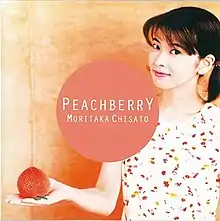| Peachberry | ||||
|---|---|---|---|---|
 | ||||
| Studio album by | ||||
| Released | July 16, 1997 | |||
| Recorded | 1996–1997 | |||
| Studio | Abbey Road Studios[1] | |||
| Genre | ||||
| Length | 54:05 | |||
| Language | Japanese | |||
| Label | One Up Music | |||
| Producer |
| |||
| Chisato Moritaka chronology | ||||
| ||||
| Singles from Peachberry | ||||
| ||||
Peachberry (ピーチベリー, Pīchiberī) is the 11th studio album by Japanese singer/songwriter Chisato Moritaka, released on July 16, 1997, by One Up Music. The album marked the 10th anniversary of Moritaka's music career. A limited edition release was packaged in a cardboard box and included 13 photographs; each with lyrics to a corresponding song.[2][3]
Peachberry draws inspiration from Moritaka's love of the Beatles' music, with some of the tracks recorded at Abbey Road Studios.[1] The song "Tony Slavin" is named after the Liverpool barber shop that the Beatles referenced in their 1967 song "Penny Lane".[4]
The album reached No. 4 on Oricon's albums chart and sold over 322,000 copies.[5][6] It was also Moritaka's last studio album to be certified Gold by the RIAJ.[7]
Track listing
All lyrics are written by Chisato Moritaka; all music is arranged by Yuichi Takahashi, except where indicated.
| No. | Title | Music | Arrangement | Length |
|---|---|---|---|---|
| 1. | "Sweet Candy (Album Version)" | Yuichi Takahashi | 4:52 | |
| 2. | "My Anniversary" (Mai Anibāsarī (マイ・アニバーサリー)) | Takahashi | 4:22 | |
| 3. | "Oshare Fū" ((おしゃれ風(ふう), "Fashionable Wind")) | Moritaka | Moritaka | 4:14 |
| 4. | "Shintō Mekkyakusureba Himomata Suzushi" ((心頭滅却すれば火もまた涼し, "If You Destroy Your Heart, the Fire Will Cool Again")) | Takahashi | 3:33 | |
| 5. | "Let's Go!" | Hiromasa Ijichi | 4:24 | |
| 6. | "Anata wa Ninki Mono" ((あなたは人気者, "You Are a Popular Person")) | Shin Kōno | Kōno | 4:57 |
| 7. | "Futsū no Shiawase" ((普通の幸せ, "Ordinary Happiness")) | Chihiro Imai | 4:47 | |
| 8. | "Mitatōri yo Watashi" ((見たとおりよ私, "As You See Me")) | Moritaka | Moritaka | 3:34 |
| 9. | "Hoshi ni Negai wo" ((星に願いを, "Wish Upon a Star")) | Ijichi | 4:53 | |
| 10. | "Kataomoi" ((片思い, "Unrequited Love")) | Kōno | Kōno | 4:44 |
| 11. | "Tony Slavin" | Moritaka | Moritaka | 4:33 |
| 12. | "Clarinet Gensōkyoku (Instrumental)" (Kurarinetto Gensōkyoku (クラリネット幻想曲, "Clarinet Fantasy")) | Moritaka | Moritaka | 1:09 |
| 13. | "Gin'iro no Yume" ((銀色の夢, "The Silver Colored Dream")) | Ijichi | 4:03 | |
| Total length: | 54:05 | |||
Personnel
- Chisato Moritaka – vocals, drums (all tracks), tambourine (2, 10), shaker (2), timbales (6), recorder (7), accordion (7), piano (8), kalimba (8), pianica (11), clarinet (12), percussion (13)
- Yuichi Takahashi – guitar (1–2, 4–5, 7, 9–11, 13), keyboards (1–3, 5, 7–9, 11, 13)
- Shin Hashimoto – piano (1–2, 5, 7, 9, 11, 13), Fender Rhodes (1, 3, 5, 8), synthesizer (2, 5, 8–9), Wurlitzer (4), guitar (7, 11), kalimba (8), taishōgoto (13)
- Shin Kōno – piano (6, 10), Fender Rhodes (6, 10), percussion (6), keyboards (10)
- Yukio Seto – bass (1–2, 4–5, 7–8, 11, 13), guitar (1–7, 9–10, 13), conga (1), shaker (1, 6), bar chimes (5, 9–10), percussion (5, 13), djembe (8–9, 11), didgeridoo (8), timbales (9)
- Masafumi Yokoyama – bass (6, 10)
- Shuhei Miyachi – bell (4)
- Toshio Araki – trumpet (6)
- Kōji Nishimura – trumpet (6)
- Masakuni Takeno – alto saxophone (6)
- Takuo Yamamoto – tenor saxophone (6, 10), flute (6)
- Masanori Hirohara – trombone (6)
- Junko Yamashiro – bass trombone (6)
- Something Else – backing vocals (2)
- Nobutaka Okubo
- Daisuke Itō
- Chihiro Imai
Charts
| Chart (1997) | Peak position |
|---|---|
| Japanese Albums (Oricon)[5] | 4 |
Certification
| Region | Certification | Certified units/sales |
|---|---|---|
| Japan (RIAJ)[7] | Gold | 200,000^ |
|
^ Shipments figures based on certification alone. | ||
References
- 1 2 Moritaka, Chisato (2012-06-15). 森高千里LONDON未公開VideoClip ~♪出来るでしょ!!~. YouTube. Retrieved 2020-04-14.
- ↑ "PEACHBERRY". Kioku no Kiroku. The Federation of Music Publishers Japan. Retrieved 2020-04-03.
- ↑ "森高千里". Idol.ne.jp. Retrieved 2020-04-03.
- ↑ Moritaka, Chisato (2012-07-14). 森高千里Liverpool未公開VideoClip ~♪Tony Slavin~. YouTube. Retrieved 2020-04-14.
- 1 2 "PEACHBERRY/森高千里". Oricon. Retrieved 2020-04-02.
- ↑ "森高千里". Yamachan Land. Archived from the original on 2011-08-14. Retrieved 2021-06-23.
- 1 2 "Japanese certifications – 森高 千里 – PEACHBERRY" (in Japanese). Recording Industry Association of Japan. Retrieved March 24, 2021. Select 1997年7月 on the drop-down menu